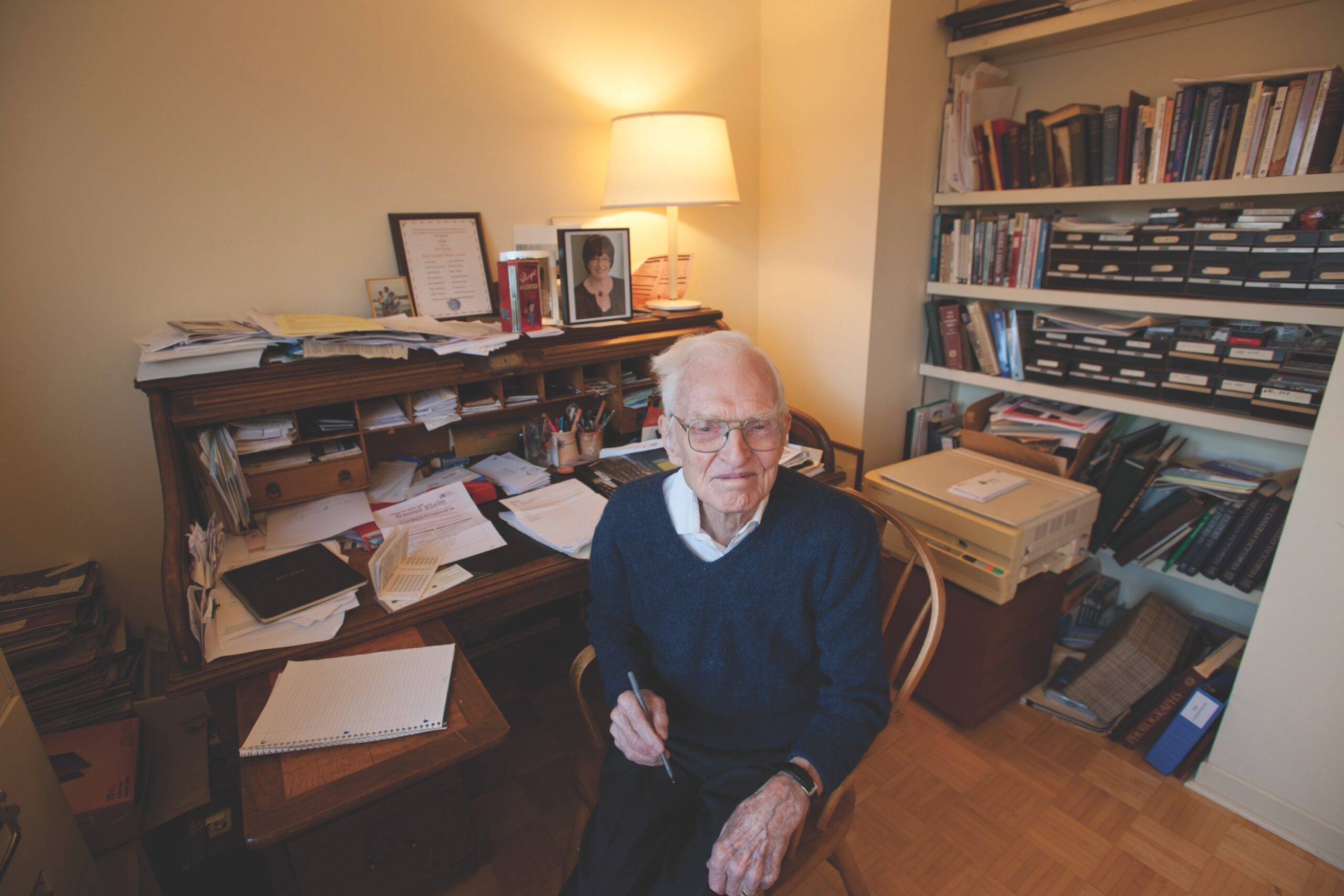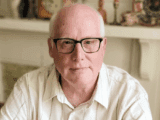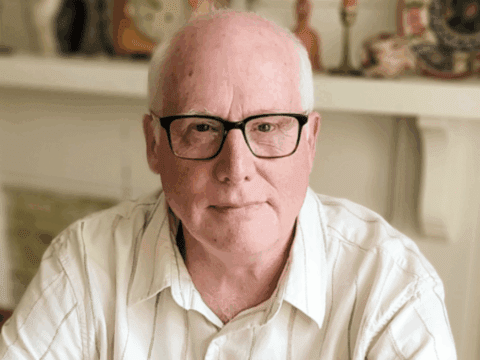A few years ago, Patricia Clarke of Toronto was vacationing in the south of France when she picked up her son’s copy of the Guardian Weekly, the highly respected and influential British newspaper. Thumbing through its pages to the letters section, she spotted a name she knows well.
Clarke has edited the letters section of The Observer for many years. Over time, she has learned to spot the regulars — readers who repeatedly weigh in on the issues the magazine raises. Among the regulars, one stands in a class all his own: Don Ewing, from Guelph, Ont.
You may unsubscribe from any of our newsletters at any time.
That was the name that jumped out at Clarke from the pages of the Guardian. “There, in a little village in the south of France,” she remarks, “thousands of miles from Guelph, I find a letter from Don Ewing.” Clarke appreciated the irony. But aware of Ewing’s prolific habits, she wasn’t entirely surprised.
Those who know Ewing, including his fellow parishioners at Three Willows United in Guelph, wouldn’t have been much surprised either. Don Ewing letters are carefully considered dispatches from a man whose long life as an activist has been shaped by a deep passion for justice and nurtured in the best traditions of the social gospel. At 95, he doesn’t have the energy he did when he was helping cobble together the New Democratic Party in the late 1950s and early ’60s. But the passion remains as vital as ever. Letter writing is a way to keep engaged in the issues that have motivated him all his life. “The letter writing,” observes his son Morrey, “is not a prime activity, but it flows from the prime activity.”
Today finds Ewing not at his desk composing another letter but at one of his favourite Guelph haunts, the LemonGrass Thai restaurant. As he finishes a generous helping of yellow chicken curry, his favourite dish, another diner pauses at the table on her way out of the quiet restaurant. “Excuse me,” she says, “but aren’t you Don Ewing?” Turns out, Ewing used to attend NDP planning meetings in this woman’s basement in the mid-1970s. “I remember you, Don!” the woman exclaims.
They don’t waste much time on pleasantries before Ewing cuts to the heart of the matter these days for any member of the NDP: “Do you have an idea who you would like for leader?” he politely inquires. Ewing has a pretty clear idea of whom he wants, although he doesn’t divulge it.
One gets the feeling that this sort of encounter happens frequently for Ewing and his wife of 63 years, Eleanor. People may remember Ewing from his career as a music teacher and musician, they may know him from years of involvement in The United Church of Canada, or maybe they met him somewhere along the way as he helped build the NDP to the force it is now.
Regardless of the context, those who know Ewing share one overriding impression. “You’re dealing with a man of high integrity,” says longtime friend and political crony Walter Pitman of Toronto. “He’s been a social democrat, a person concerned with making Canada a progressive and compassionate nation, and he’s never gone off that. He’s never changed his course.”
It is a course that was set in the early days of the Second World War when Ewing was a young university student. He registered as a conscientious objector, influenced by the early leaders of the Co-operative Commonwealth Federation, United Church ministers (some of whom were CCF leaders), radio preacher Harry Emerson Fosdick and especially his pacifist mother. In all the years since, Ewing’s pacifism has never wavered. He quotes Fosdick in his 2008 memoir, As I Recall: “There are worse things than war, and war brings all of them.”
Esther Ewing, Don and Eleanor’s daughter, remembers her father refusing to stand and sing Onward Christian Soldiers at church. “I was so embarrassed,” she says, laughing about it now. “He’s always been a man of his convictions.”
Being a conscientious objector during the war years landed Ewing in the British Columbia forestry service, cutting and hauling wood and on call to fight forest fires. When he heard that Japanese Canadians were being relocated to camps in the B.C. interior, Ewing volunteered his services as a teacher. He spent three years (1943-46) at the Lemon Creek Internment Camp in the Slocan Valley, teaching in makeshift classrooms — sometimes by the wavering light of propane lanterns.
Japanese-Canadian youth emerged from the camps with an education they would not otherwise have likely received — and Ewing emerged with a pivotal education in injustice. “The prejudice against these people . . . you had to experience it to believe it,” he says.
Rev. John Buttars, a retired United Church minister from Guelph who has moved in the same circles as the Ewings for years, describes Ewing’s activism as a “broad compassionate orientation.” Esther agrees. “My father is kind of the core of what you’d say is grassroots activism. He’s passionate about peace.”
That passion found a political home in the CCF and later the new national party into which it morphed, the NDP. Ewing was there from the beginning. “Don was involved with party clubs in the Guelph area, when the CCF was trying to encourage people who didn’t see themselves as socialists but saw themselves as left-wing democrats,” says Pitman, himself a key figure in getting the NDP off the ground. Ewing’s memoir offers up details on riding byelections, his perspectives on leaders — and even fesses up to the “only two occasions” when he cast his vote for a candidate outside the CCF or NDP.
In 2006, at age 90, Ewing attended the NDP national convention in Quebec City. “He had a resolution that mattered to him,” recalls son Morrey. “The person who got up to speak on the resolution just wanted people to know the author of the resolution was Don Ewing — and the whole convention got up and gave him a standing ovation.”
“He was always just so solid, so sensible and so hard-working,” says longtime NDP organizer Michael Lewis. “He would usually have something important to say.”
Half a century later, Ewing still has important things to say — but more often now, he says them in those letters to the editor for which he is so well known. Ewing takes great care thinking through and crafting the letters he writes. It is a deliberate use of time and energy from a man who is clearly slowing down, who searches carefully for a word that eludes him (and politely asks your forgiveness as he does so), but whose mind and heart are as fully engaged in the issues as ever. “Sometimes I’m not quite sure of my wording and I leave it in the computer till morning. In the morning, I think of changes to make, things to add or subtract. I always have to go back over it for mistakes,” he says.
Patricia Clarke, the Observer contributor who spotted Ewing’s name in the Guardian, wishes there were more letter writers like him. “He’s very good at being brief. He has a point, he makes it.”
A Don Ewing letter is the first thing that Walter Pitman looks for in The Observer. “He reads well and widely,” says Pitman. “He’s thoughtful. He writes letters very well. He goes right to the point, and he draws on the social gospel to create a letter that makes its point bluntly and very clearly.” Adds Rev. Don Gillies of Burlington, Ont., whose family has cottaged on the same central Ontario lake as the Ewings for many years: “I wish that more people would take that much interest and have that strong an opinion on things. He’s taking his calling seriously to be a committed layperson.
The other passion in Ewing’s life sits in the lower level of the Ewings’ three-storey condo building in Guelph: his piano. When he retired from being a music teacher, Ewing relished the opportunity to expand his own playing. Every Wednesday at 10 a.m., Ewing walks to the nearby home of Valerie Candelaria, his piano teacher for the last 26 years. “He’s accompanied half the people in this city through the years,” says Candelaria. “The students love to see him play; he inspires everybody.” The “pièce de résistance at the end-of-the-year recital every year is Dad,” says Morrey. “Last January, he picked up Mendelssohn’s Songs Without Words, he took 10 of them and really cracked them. That obviously keeps him enormously alive.”
Ewing e-mails Candelaria his chosen repertoire each spring so she knows what he will want to focus on in the year ahead. “I brag about him to everybody. I can’t even think about what he hasn’t played,” she says.
Ewing is still active in the choir at Three Willows United, although failing eyesight makes reading music more difficult these days. “I sing the sol-fa notes,” Ewing explains. “As in ‘do, re, mi, fa, sol.’ The leader doesn’t mind a bit. I do sing in tune, after demanding that kids do that all my life. If the words are ‘Hallelujah,’ well then, I can sing along.”
These days, it is Soaring from Robert Schumann’s Phantasiestücke that sits open on Ewing’s piano. On an online music site, words like “insistent,” conveying “dire urgency and heroism” are used to describe this piece. Ewing’s own copy is covered in pencilled-in notes of instructions and reminders. A lot of them are about pace and timing. Faster here. Slower now. The notations seem apt for the man himself, playing it so carefully and so faithfully, determined to get it right.
***
This story first appeared in The United Church Observer’s February 2012 issue with the title “Man of letters.”














